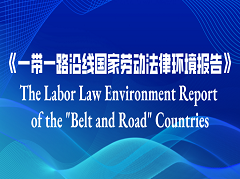本文作者/The Author:
阿什维尼・维塔拉查尔 Ashwini Vittalachar
本文译者/The Translator:
刘含玥 Liu Hanyue
一、 前言 Foreword
作为中国“一带一路”倡议的重要支点国家,印度以其庞大人口基数孕育的广阔消费市场、经济改革释放的政策红利以及在信息技术等领域积累的产业优势,持续吸引中资企业的目光。然而,在印度开展投资合作需关注其复杂的劳动法律环境。在印度,中央政府和各邦政府均有权制定劳动法法规。因此,尽管中央立法确立了劳动法的总体框架,但各邦仍可根据地方特殊法律和具体情况调整实施细则,不同邦之间法律亦存在差异。
As a crucial pivot country in China’s Belt and Road Initiative, India continues to attract Chinese enterprises with its vast consumer market booming from a massive population, policy dividends unleashed by economic reforms, and industrial advantages accumulated in sectors like information technology. However, investing in India requires attention to its complex labor law environment. In India, both the central and state governments hold decentralized legislative power over labor regulations. Therefore, while central legislation establishes the overarching framework for labor laws, individual states may adapt implementation rules based on local statutes and specific circumstances, resulting in legal variations across different states.
在《印度劳动法概览》中,拥有多年实务经验的Ashwini Vittalachar律师作为主要作者,系统地讲解了印度劳动法法律框架和在印投资企业人力资源管理注意事项,涵盖劳动合同签订、履行、终止的各个方面。为中资企业在印度投资合作提供了全面、专业的劳动法指引,帮助企业有效识别和防范劳动用工法律风险,确保人力资源合规管理,助力企业在印度市场高效稳健开展业务。
In the Indian Labor Law Overview, Ms. Ashwini Vittalachar, drawing on extensive practical experience as the principal author, systematically elucidates India’s labor law framework and provides operational guidelines for human resource management in enterprises investing in India. The Indian Labor Law Overview comprehensively covers all phases of the employment contracts—from execution and fulfillment to termination. Serving as a comprehensive and professional legal reference, this work equips Chinese enterprises engaged in Indian investment collaborations with actionable insights to effectively identify and mitigate employment-related legal risks, ensure HR compliance, and navigate the Indian market with robust and efficient operations.
(下文为《印度劳动法概览》节选内容之上半部分,完整版详见《一带一路沿线国家劳动法律环境报告》之印度篇)
(The following content is excerpted from the Indian Labor Law Overview - Part A. For the full version, refer to the Indian Chapter in the Invitation to Contribute to The Labor Law Environment Report of the " Belt and Road" Countries.)
二、 核心立法 Key Legislations
《劳资纠纷法》:作为印度劳动法体系的核心立法之一,该法适用范围主要针对“工人”群体。其规范工业争议的处理——涵盖罢工、停工、裁员等争议事项,并规定劳动关系终止情形下工人权利保障。《劳资纠纷法》旨在通过调解、仲裁和裁决解决劳资纠纷,同时为工会组建和工人行使参与决策权提供指导。
The Industrial Disputes Act (“ID Act”): This is one of the most significant pieces of legislation in India’s labor law framework and primarily applies to “workmen”. It addresses industrial disputes – covering strikes, layoffs, retrenchment, and workers’ rights during the termination of employment. The ID Act aims to resolve disputes between employers and employees through conciliation, arbitration, and adjudication. It also provides guidelines for the formation of trade unions and workers’ rights to participate in decision-making.
《工厂法》:该法涉及工厂工人健康保护、安全与福利,设定工作时间限制,规定休息时间及工作场所的安全条件,并强制要求企业提供清洁安全的工作环境。该法还包含对年轻工人和女性工人的雇佣规定,确保弱势群体在工业环境中得到应有的保护。
The Factories Act: The Factories Act governs the health, safety, and welfare of workers employed in factories. It sets limits on working hours, provides for rest intervals, regulates workplace safety conditions, and mandates provisions for clean and safe working environments. It also has provisions for the employment of young workers and women, ensuring protection for vulnerable employees in industrial settings.
《工资支付法》:该法确保员工按时定期获得工资且不会被无故扣款,适用于收入低于特定工资上限的员工,并对工资支付周期、扣款事项及企业违规处罚等方面予以规范。
The Payment of Wages Act (“PW Act”): This law ensures that employees are paid their wages regularly, on time, and without unauthorized deductions. It applies to workers earning less than a specific wage ceiling, and it governs aspects like wage payment schedules, deductions, and penalties for employers who fail to comply.
《员工公积金法》:该法强制设立公积金作为退休储蓄基金,要求企业按工资的特定比例向该基金缴款,员工缴纳比例与企业相同。该法还涵盖养老金计划等其他福利。
The Employees’ Provident Funds and Miscellaneous Provisions Act (“EPF Act”): This law mandates the creation of a provident fund, which serves as a retirement savings fund. Employers are required to contribute a specific percentage of the salary to this fund, with both employer and employee making matching contributions. The EPF Act also covers other welfare benefits like pension schemes.
《员工国家保险法》:该法规定员工在患病、生育、伤残或工伤致死时有权获得社会保障与医疗保险福利,强制要求企业向确保员工在困难时期获得医疗护理和经济支持的基金缴款,适用于收入低于特定限额的员工。
The Employees’ State Insurance Act (“ESI Act”): This law provides social security and health insurance benefits to employees in case of sickness, maternity, disability, or death due to employment-related injuries. It mandates employers to contribute to a fund that ensures employees receive medical care and financial support during challenging times, covering workers earning below a specified wage limit.
三、 外国人就业管理 Management of Foreigners' Employment
外国公民在印度的就业主要受移民法管辖,特别是1946年《外国人法》、1948年《外国人令》及内政部颁布的相关规则与指引。获取正确签证并遵守注册要求是合法就业的关键。
The employment of foreign nationals in India is primarily governed by immigration laws, specifically the Foreigners Act, 1946, the Foreigners Order, 1948, and associated rules and guidelines issued by the Ministry of Home Affairs. Obtaining the correct visa and adhering to registration requirements are crucial for legal employment.
(一)工作签证与工作许可 Employment Visa and Work Authorization
拟在印度工作的外国公民须在入职前取得适当工作许可及签证。常见就业类签证类别包括:
Foreign nationals intending to work in India must secure appropriate work permits and visas before commencing employment. The most common visa categories for employment purposes are:
1. 工作签证(E签) Employment (E) Visa:
E签是外国公民在印度得以长期就业的主要签证类别,适用于高素质外国专业人士,或受印度公司或组织以合同或劳动合同聘用的高级别、技术性或高技能职位人员。该签证要求最低年薪为25,000美元(特定类别如民族厨师、翻译和使馆工作人员除外),并需由在印度注册的企业提供担保。通常E签首次签发有效期为一年,根据持续雇佣情况及签证规定可延期至最长五年。E签持有人一般仅可为担保企业工作且仅能从事签证核定的具体岗位。更换就业单位或岗位需重新申请签证并获得批准。
This is the primary visa category for foreign nationals seeking long-term employment in India. It is granted to skilled and qualified foreign professionals or persons being engaged or appointed by companies or organizations in India on a contract or employment basis at a senior level, skilled position, or highly skilled position. It requires a minimum annual salary of USD 25,000 (except for certain categories like ethnic cooks, translators, and embassy staff) and a sponsorship from a registered Indian employer. Typically initially granted for one year, the E-Visa can be extended up to a maximum of five years, subject to continued employment and visa regulations. E-Visa holders are generally restricted to working for the sponsoring employer and in the specific role for which the visa was granted. Changing employers or roles requires fresh visa applications and approvals.
2. 商务签证 Business Visa:
商务签证签发给拟在印度开展短期商务会议及贸易活动(如参会、参展或商机考察)的外国公民。该签证有效期为六个月至五年不等,亦可延期。商务签证受特定要求与限制约束(如商务活动性质及停留时长)。该签证不允许在印度全职就业,故商务签证持有人不可被印度实体直接雇佣。
The Business Visa is issued to foreign nationals for short-term visits for business meetings and trade activities in India, such as attending meetings, conferences, or exploring business opportunities. Such visa is valid for a period of six months to five years and can be extended. The Business Visa is subject to specific requirements and limitations, such as the nature of business activities and the duration of stay. Such visa does not permit full-time employment in India and therefore, business visa holders cannot be directly employed by an Indian entity for regular employment.
3. 项目签证 Project Visa:
项目签证签发给拟参与印度特定项目(尤见于信息技术、咨询及工程领域)的外国公民。项目签证有效期与项目周期一致并可延期。该签证受项目性质、周期及外籍员工资质等特定要求与限制约束。
The Project Visa is issued to foreign nationals who wish to work on specific projects in India, especially in sectors such as information technology, consulting, and engineering. The Project Visa is valid for the duration of the project and can be extended. The Project Visa is subject to specific requirements and limitations, such as the nature of the project, the duration of the project, and the qualifications of the foreign employee.
需要注意的是,通常情况下,印度不允许在印度境内将旅游签证或其他类型签证转换为工作签证。外籍员工一般须返回母国申请E签、商务签证或项目签证。签证规定可能有所调整,须以印度移民主管部门发布的最新指引为准。
It is also important to note that it is generally not permissible to convert a Tourist Visa or other types of visas into an Employment Visa while being already present in India. Foreign nationals usually must return to their home country to apply for an E-Visa, Business Visa, or Project Visa. Visa regulations are subject to change, and it is essential to consult the latest guidelines issued by Indian immigration authorities.
(二)特定行业的就业限制 Restrictions on Employment in Certain Sectors
基于国家安全、战略利益或政策考量,印度对特定行业的外籍员工就业进行限制:
Foreign nationals are subject to restrictions on employment in certain sectors in India due to national security, strategic interests, or policy considerations:
1. 政府项目与国防相关产业 Government Projects and Defense-Related Industries
敏感政府项目及国防相关产业通常仅限印度公民从业,特殊情形下获特定豁免或批准除外。
Employment in sensitive government projects and defense-related industries is generally restricted to Indian citizens unless specific exemptions or approvals are granted in exceptional circumstances.
2. 行业限制 Sectoral Limitations
部分行业可能限制外籍人员参与或设有针对外籍员工就业的专门规定。例如:多品牌零售、农业及部分媒体与电信领域可能设置外国直接投资限制或对印度公民就业优待。此类限制可直接影响外籍员工的岗位范围。
Certain sectors may have limitations on foreign participation or specific regulations regarding the employment of foreign nationals. For instance, sectors like multi-brand retail, agriculture, and certain segments of the media and telecom sectors might have FDI restrictions or preferential treatment for Indian citizens in employment. These restrictions can be direct or indirect, impacting the scope of roles available to foreign employees.
3. 行业特定政策 Sector-Specific Policies
需审查行业特定政策与法规,以确认特定行业雇佣外籍员工是否存在限制或特殊要求。
It is essential to examine sector-specific policies and regulations to ascertain if there are any limitations or specific requirements related to the employment of foreign nationals in particular industries.
(三)入境后登记要求 Post-arrival Registration Requirements
持E签、商务签证或项目签证(有效期超过180天)入境印度的外国公民,须在抵印14天内向外国人区域登记处(“FRRO/FRO”)登记。该流程包括提交必要文件(护照、签证、地址证明、劳动合同等)及可能提供生物识别信息,主要城市通常通过电子FRRO门户在线办理。
Foreign nationals entering India on an E-Visa, Business Visa, or Project Visa (if the validity is for more than 180 days) are mandated to register with the Foreigners Regional Registration Officer (“FRRO”) or Foreigners Registration Officer (“FRO”) within 14 days of their arrival in India. This process involves submitting required documents (passport, visa, address proof, employment contract, etc.) and potentially providing biometric information. The process is typically managed online through the e-FRRO portal in major cities.
外国员工有义务向外国人区域登记处申报地址变更、工作变动或永久离境信息。
Foreign employees are obligated to inform the FRRO/FRO of any changes in their address, employment, or if they leave India permanently.
作者/About the Authors
阿什维尼・维塔拉查尔 Ashwini Vittalachar
阿什维尼・维塔拉查尔(Ashwini Vittalachar)是一位资深劳动法执业律师,拥有超过15年的从业经验,擅长为各类客户就劳动法及员工关系相关的广泛事务提供专业咨询。她的客户群体涵盖跨国企业、初创公司、独角兽企业以及个人,这使她具备平衡的视角和全面的问题解决能力。
她尤其在交易性劳动法咨询、合规顾问服务以及主导内部调查(尤其是职场骚扰、多元化等问题)领域备受青睐。作为多家法人实体内部委员会的外部成员,她定期提供专业建议。客户尤其认可她在内部调查中的全程指导,无论是性骚扰事件、行为准则问题、调解、利益冲突或其他员工/雇佣相关投诉。此外,她定期开展关于防止职场性骚扰(POSH)、性别意识提升和多元化、公平与包容(DEI)等主题的培训。她还在政策制定、内部重组、裁员与员工解雇、设计薪酬结构(针对高管及其他员工)、员工持股计划(ESOP)架构设计、合规监管、福利评估及其他劳动法相关问题上提供专业咨询。
自2022年起,阿什维尼连续被《钱伯斯亚太法律指南》(Chamber & Partners)评为劳动法领域杰出执业律师,并自2016年起持续被《法律500强亚太指南》(Legal 500 Asia-Pacific)列为劳动与就业领域推荐律师。此外,她还被中华全国律师协会推荐为“一带一路”地区领先律师之一,并定期在多个平台发表劳动法相关文章。
Ashwini Vittalachar is an established employment law practitioner with more than 15 years’ experience in advising a wide range of clients on a broad spectrum of matters on all things related to employment law and employee relations. Her clientele includes global companies, startups, unicorns as well as individuals, giving her a balanced view and a holistic problem-solving ability.
She is particularly sought after for her transactional employment law advisory, compliance advisory as well as in steering internal investigations, especially on issues of workplace harassment, diversity among other things. She regularly advises as an external member on several internal committees of body corporates. Her clients especially appreciate her handholding on the internal investigations, be it in the context of sexual harassment concerns, code of conduct issues, conciliation, conflict of interest issues or any other employee/ employment related complaints. She regularly conducts trainings on POSH, gender sensitization and DEI among other things. She also advises on policy making, internal restructuring, retrenchment and employee terminations, devising compensation structures (senior employees and otherwise), ESOP structuring, regulatory compliance, benefits evaluation and such other employment law issues.
Ashwini has been recognised by Chamber & Partners as a notable practitioner in their Asia-Pacific guide for Employment since 2022, and has also been continuously recognised as a recommended lawyer for Labor & Employment by Legal 500 Asia-Pacific since 2016. She has further been recommended by All China Lawyers Association as one of the leading lawyers in the Belt and Road region. She regularly publishes articles on employment law on several platforms.
刘含玥 Liu Hanyue
刘含玥律师执业领域为劳动法和社会保障法。为多家企业提供法律咨询及顾问服务。
刘含玥律师具有法学学科背景,先后毕业于郑州大学和外交学院,取得法学学士和法学硕士学位。
Ms. Liu Hanyue specializes in labor law and social security law, providing legal consultation and advisory services to multiple enterprises.
Liu Hanyue has a solid academic background in law. She graduated from Zhengzhou University and China Foreign Affairs University, and has obtained a Bachelor of Laws and a Master of Laws degree respectively.





